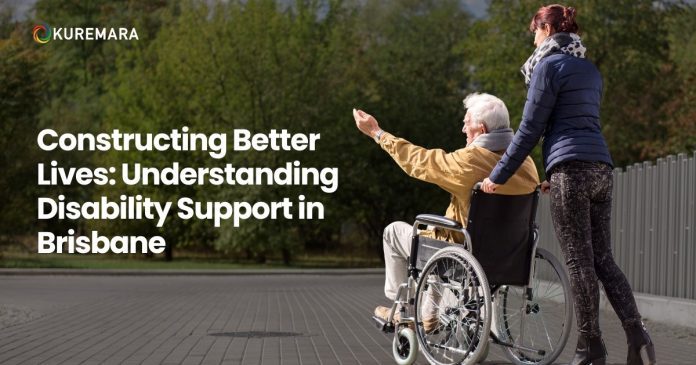Identifying an appropriate disability support can feel like a big burden for many individuals and families. With so many options available, it is important to identify not only what the disability support options are, but how they can enrich an everyday life experience. Brisbane is home to a network of providers that can support accommodation, in-home care, participation in community, and short-term care support.
This blog aims to provide an overview of disability support options in Brisbane, how they work, and what considerations you might want to keep in mind when determining what is appropriate for you or your loved one.
Why Disability Support is Important
Disability support is more than just assistance with daily living activities; it is about supporting independence, building skills, and enhancing life quality. This support is especially significant for individuals who are part of the National Disability Insurance Scheme (NDIS). If you identify personal goals and outcomes that focus on areas of independent living, educational access, employment, or social participation, a suitable service plan will contribute to support.
Families benefit from professional disability support as well, as it can lessen stress and improve familial peace of mind that their family member or loved one is being supported or cared for in a dignified and respectful manner by appropriately trained workers.
Essential Support Options in Brisbane
1. Supported Independent Living (SIL)
Supported Independent Living is for people who are looking to live as independently as possible while still receiving support to suit their needs. Generally, participants live in a shared home with other participants of SIL, or within their own home with support staff visiting regularly to provide assistance. This can vary from assistance with meal preparation, and cleaning, to personal care, medication assistance, and skill development.
Supported Independent Living services in Brisbane vary across communities, supporting participants to choose a home close to family and friends or community resources. The SIL environments are all intentional in their design to create safety and security with independence.
2. Short-Term Accommodation (STA)
Short-Term Accommodation, sometimes referred to as respite, gives people a temporary home-away-from-home experience. This is particularly useful for people wanting to test living more independently, try living in a new environment, or for their family or carer to have a well-deserved break.
Short-Term Accommodation services in Brisbane can be for one night, a weekend, or vary in length, as decided by the participant’s plan and goals. Support provided during a STA will typically include personal care, meals, activities within the community, and social connections. Many families choose STA providers Brisbane that offer flexible packages tailored to both the participant’s and the carer’s needs, ensuring peace of mind and meaningful experiences.
3. Community Participation
Another helpful form of support is to assist with participation in community activities. Examples of community participation include attending local events, community recreation programs and gaining access to education and training opportunities for employment. For many participants, engaging in the community is a big part of feeling connected and valued.
Support workers are there to provide guidance and support, while also working to support the person’s self-advocacy, confidence, and their ability to create relationships with others outside of their home.
4. In-Home Support
For participants who elect to stay in their own homes, in-home support provides ways to support coffee requirements. This may include personal care, meal preparation, transportation, or domestic assistance. The personal aspect of this form of support allows participants to remain in their comfort zone while still receiving the care needed for satisfaction and independence.
Choosing a Support Service
1. Understand Your Needs
The first step is to determine and clarify what you will need support for. Is it all about independence or is it all about safety and wellbeing? Some participants thrive on socializing with others in a residential setting while others need occasional support in their own homes.
2. Take Notice of Location
Being close to family, work, school, or leisure activities can affect people’s daily life in a very meaningful way. Engaging a provider with services or properties in convenient locations lets participants stay connected to their favorite communities.
3. Look at Experience and Reputation
When selecting a provider, it may help to have a look at their history. A more experienced team is probably going to be better able to produce consistent, quality care, and reviews, testimonials, and word-of-mouth referrals may provide insight.
4. Service Flexibility
Life quickly changes. The right provider will adapt to changing circumstances, and provide flexible combinations and scalable support levels to participants over time.
5. NDIS Goal Alignment
Supports should relate directly back to the participant’s NDIS goals whether those goals are independence, health, or social connection. Providers focused on goal achievement are more likely to provide services with meaningful, long-term utility.
Advantages for Families and Caregivers
Family caregivers can provide crucial support for individuals with disabilities, but there is also a need for caregivers to recharge. Disability support services are able to give caregivers a break with the assurance that their loved one is in reliable hands. Family wellbeing is improved through breaks, reduced family stress, and support that allows for greater balance between caregiving, household tasks, and personal lives.
For families, this also provides them even more space to think about relationships beyond caregiving. Parents can enjoy being parents, siblings can be siblings, and partners can enjoy a more equitable relationship.
A Day in the Life with Supported Independent Living
Consider a participant in Brisbane who is just starting to transition to Supported Independent Living. Their day may start with a support worker helping them prepare a healthy breakfast and arrange a schedule to pursue personal goals such as finding a job or studying. Next, they may attend a community art class facilitated by a transport support service to ensure they travel safely. After the art class, they could attend an evening activity with their housemates or return to their home for a quiet evening based on their preferences.
On another note, participants using Short-Term Accommodation may have the opportunity to spend a weekend visiting local attractions, participating in shared experiences, and trying new activities within a supporting environment. Such experiences also build confidence and help create memorable moments.
The Bigger Picture: Building Inclusive Communities
Disability support services are not just based around the individual; rather, they are part of creating an inclusive community for all. The City of Brisbane, in particular, has been focusing on including all individuals with all abilities, as evident by making public spaces more accessible, schools incorporating more inclusive practices, and workplaces becoming more inclusive. Providers can, and do have a role in fostering inclusion, by facilitating opportunities for their participants to engage with and contribute to society and emphasizing the importance of diversity.
Conclusion
The process of finding the right disability support service in Brisbane starts by identifying needs, reality checking the options available, and finding the right provider for partnered outcomes based around what is important for each participant. Supported Independent Living (SIL), Short-Term Accommodation (STA), supported in-home support, or community participation opportunities all provide unique structural advantages based on individual participant’s needs.
For anyone exploring their options, it is also worth mentioning that trusted SIL providers Brisbane provide a structured environment where participants have the opportunity to develop independence, while also having the supportive staff to help when needed. Equally, Brisbane can provide opportunities for individuals to gain new experiences and help their carers feel less burdened. Together these two types of services provide a needed, key component of a thriving community.

